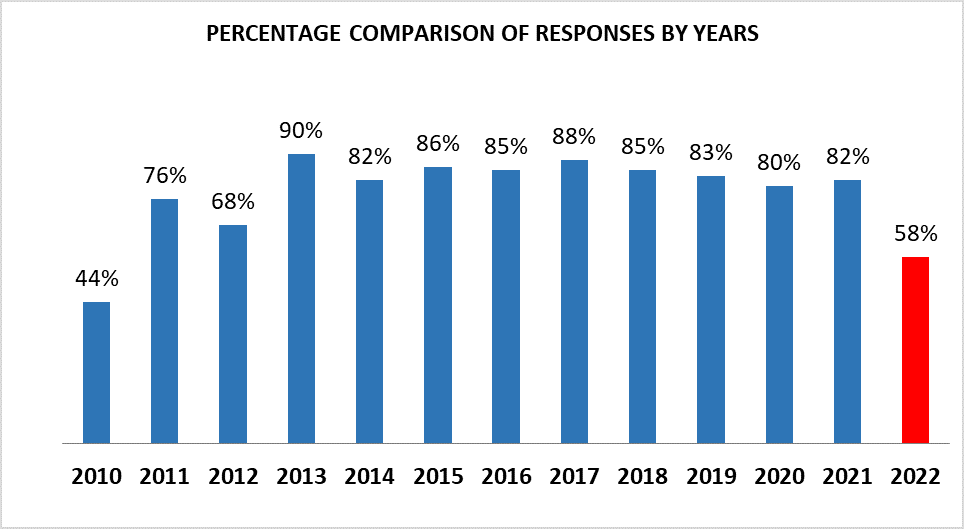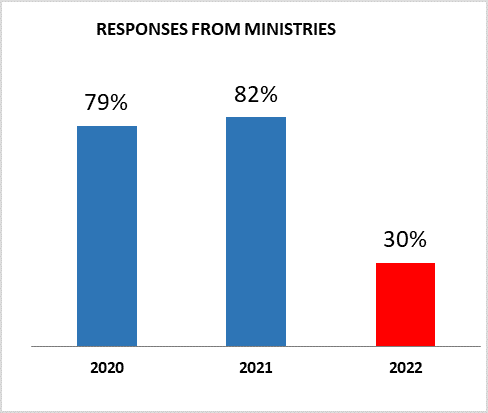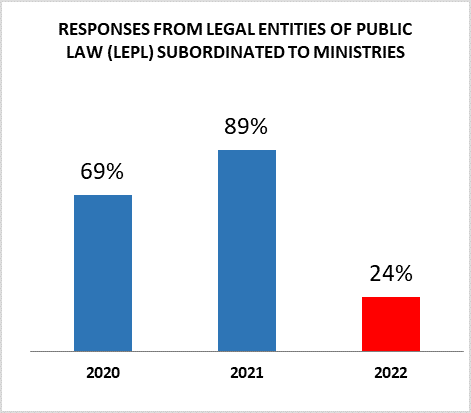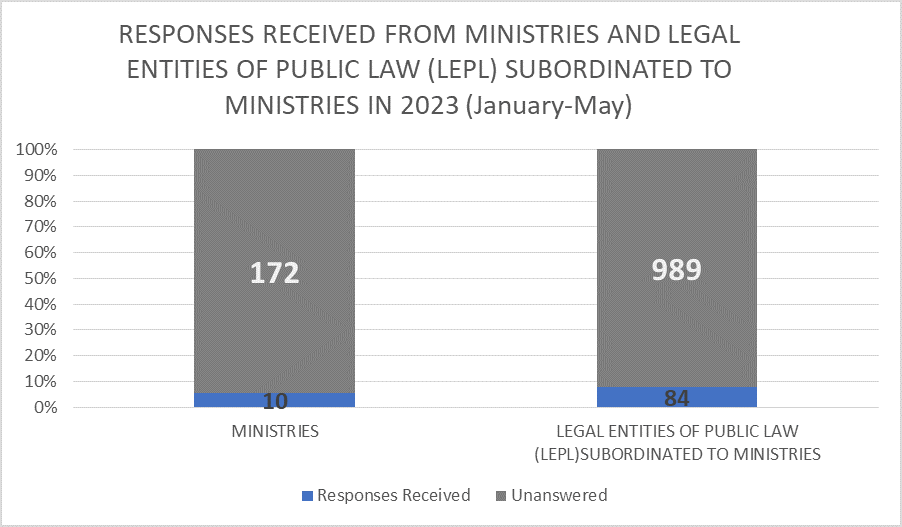


Starting in 2022, the accessibility to information in Georgia has sharply deteriorated. For example, the rate of responses to public information requests in 2022 (58%) was the lowest since 2010. the accessibility to information has declined the most in terms of the ministries and agencies under their jurisdiction, which left IDFI's public information requests unanswered for the most part.
The tendency of restricting access to public information by Georgia's executive authorities actively continued in 2023 as well. In the first 5 months of 2023, IDFI sent 1,255 requests for public information to ministries and its subordinate agencies, out of which only 94 requests (7%) were answered. In response to this, on June 2, 2023, IDFI simultaneously submitted an unprecedented number of administrative complaints - 89 administrative complaints (11 ministries, the Office of the state minister and 77 subordinate agencies). It should be noted that these institutions not only failed to disclose public information but completely ignored the requests sent by IDFI, which is a violation of both the material and formal requirements of the law.
The deterioration of accessibility to public information is essentially an obstacle to the implementation of effective public oversight mechanisms and radically reduces the quality of accountability of state bodies. This should be considered a central issue, especially in light of the second priority set forth by the European Union as a condition for granting candidate status is related to the increase in accountability and transparency of public institutions. Moreover, Representatives of the Georgian government often emphasize in their local and international speeches the importance of prioritizing transparency and accountability, all the while the accountability of state bodies is quickly deteriorating.
IDFI’s experience indicates that since 2022, the availability and accessibility of public information and therefore the quality of accountability of state bodies has dramatically deteriorated. The main cause of this is the systemic illegal actions of public institutions and the absence of effective legal mechanisms to prevent such actions.
Transparency and accountability of state bodies is a constituent part of democratic governance, in turn, freedom of information is one of its most important elements. The second priority of the candidate status conditions set forth by the European Union requires the strengthening of the effective accountability mechanisms of state authorities, and the evaluation report of the European Commission emphasized that the practical problems of public information accessibility need to be solved. thus, ensuring the availability of public information has a significant impact on the Euro-Atlantic integration process of Georgia.
Representatives of the Georgian government often stress the importance of transparency and accountability and refer to the results of the "Open Budget Index (OBI)" to illustrate Georgia’s progress in this regard. According to the 2021 results of the OBI, Georgia ranked first among 120 countries in the world. This index, which was developed by the International Budget Partnership, assesses the extent to which the country's central government ensures timely and comprehensive access to budget documents for the public. Despite the importance of the mentioned index, the Georgian government often misinterprets the assessment obtained by this index to the public and exploits it to justify various undemocratic initiatives. For example, the Prime Minister of Georgia, while justifying the purpose of initiating the so-called “Russian law”, stated that the Georgian government was considered one of the most transparent in the world, as proof of which he cited the assessment obtained by the mentioned index. Incorrect interpretations caused significant concern on the part of the organization that authored the index, which stated in a statement that they could not accept the use of the open budget research rating by the Georgian government to justify the "Draconian law" that restricted independent civil society under the pretext of transparency. At the same time, it was explained to the public that the results of the index did not mean that Georgia is fully transparent, accountable, and inclusive to the public beyond the budgetary process.
One of the most important measures of the transparency and accountability of the government is the state of freedom of information in the country. The Institute for the Development of Freedom of Information (IDFI) has been monitoring the availability of public information in Georgia since 2010, the results of which are presented to the public every year. According to IDFI’s latest report, the accessibility to information in Georgia has sharply deteriorated as of 2022. in particular, the response rate to requests sent in 2022 (58%) was the lowest since 2010. In 2022, the index of information availability deteriorated for most categories of public institutions, although the ministries and agencies subordinate to them showed significantly worse results, failing to respond to a large portion of IDFI's public information requests. The ministries and their subordinate agencies are the main constituents of Georgia’s executive government and are responsible for the disposal of a significant portion of the budget funds. therefore, the sharp deterioration in the quality of their transparency in 2022 had a significant impact on the country’s situation in this regard.



In 2022, in the wake of the conditions set for granting Georgia the status of a candidate country for the European Union, the existing extent of the deterioration of access to information raised significant concerns regarding the political decision of the Georgian authorities to restrict freedom of information in the country. The tendency of restricting access to public information by the executive authorities of Georgia continues actively in 2023 as well.
In the first 5 months of 2023, IDFI sent a total of 1,255 requests for public information to Ministries and their subordinate agencies, of which only 94 requests (7%) were answered. among them, 182 requests were sent to the Ministries of Georgia (11 Ministries and the Office of the Minister of State), and the remaining 1,073 requests were sent to the Ministries' subordinate agencies (81 LEPLs and other subordinate institutions).

In the first 5 months of 2023, the majority of requests sent to Ministries and agencies subordinate to them represent requests of standard content related to the disposal of administrative expenses. including:
- Salary expenses, including salaries of public officials;
- Remuneration amounts of persons employed under administrative and labor contracts;
- Current staff lists and their remuneration;
- Representation expenses;
- Information about the state vehicle fleet;
- Fuel costs and limits;
- Mileage and average fuel consumption of state automobiles;
- Social assistance provided for employees from the institution’s budget;
- Business trip expenses;
- Databases of the state register;
In 2023, as of May 30, the requested standard content information, unlike the previous year, did not include the requirement of financial documentation confirming separate expenses, which previously may have been one of the obstacles to the disclosure of information by public institutions. Despite this, the standard content requests were left unanswered by all ministries similarly to last year, and only 4 of the 81 agencies under their jurisdiction provided IDFI with certain information.
In addition to standard content requests, obtaining information on various issues of high public interest from specific relevant institutions is still a significant issue. For example, the Ministry of Internal Affairs refused to disclose information about the resources used in the measures to subdue the large-scale manifestations of March 7-9, 2023 in Tbilisi, and the National Agency of the Public Registry refused to release information related to real estate purchased by Russian citizens, The State Security Service did not disclose statistical data regarding their covert audio surveillance, etc.
Moreover, in 2023, individual public institutions no longer provided certain information that was previously freely accessible. For example, in 2023, the Ministry of Internal Affairs no longer provided IDFI with detailed information about the crossing of the Georgian border by foreign citizens. In 2023, the revenue service presented IDFI with an incomplete database of restricted shipments.
Against the backdrop of the deterioration of the current situation in terms of the availability of public information, judicial oversight gains special significance. Before 2022, IDFI was mostly engaged in strategic litigation related to the release of public information. However, since 2022, the large-scale failure of public institutions to respond to requests for public information has contributed to the change in the IDFI's litigation policy, which is reflected in the active use of mechanisms for protecting the right to receive public information. For example, in 2022, IDFI submitted 56 administrative complaints to the relevant public institution, and 16 lawsuits were filed in court. In the first 5 months of 2023, IDFI has submitted more than 100 administrative complaints. among them, on June 2, 2023, IDFI submitted administrative complaints in bulk to 11 ministries, the Office of the state minister and their subordinate 77 agencies, which did not respond to IDFI's standard public information requests.
Despite the active use of legal mechanisms by IDFI, issues related to the effectiveness of the existing mechanisms for protecting the right to access to public information require special mention. For example, the current legislation does not recognize a dedicated agency that oversees the disclosure of public information, which would effectively guarantee the timely and complete provision of information by public institutions. also, the analysis of the most recent practice carried out by the IDFI revealed that the request for public information through the court was ineffective and the existing practice of violating the procedural rules effectively lost the essence of this right and made its effective implementation impossible (court proceedings take several years to complete).
In addition, this year, IDFI was faced with a court decision regarding the disclosure of public information, which went beyond the legal scope and raised suspicions that the accessibility of public information is being restricted in coordination with the court system.
More specifically, IDFI has been calling for the release of government decrees in the form of public information. Since March 2020, the Administration of the Government has stopped publishing regulations on the website, although this obligation has been prescribed by law[1]. IDFI addressed the government with a request for the disclosure of the decrees in the form of public information, but neither the statement nor the subsequent appeal received any response.
The hearing of the case at the first instance court dragged on for 2 and a half years, even though the process should not exceed 2 months, and 5 months in particularly difficult cases. On May 19, 2023, Judge Nina Shcherbakov, whose 3-year probationary period will expire in December of this year, did not impose on the government the obligation to disclose open and public information established by its own regulations. The motivation of the court is unknown, as the reasoned decision has not yet been released, although it is difficult to explain the refusal to provide information that is considered public by law while the defendant has not made a statement of defense or presented any legal argumentation.
In addition to the circumstances discussed above, concerns about the political decision of the government regarding the restriction of freedom of information in the country are further confirmed by media coverage of instances of persons responsible for providing public information being pressured in violation of the law to restrict disclosure in some cases. For example, Studio Monitor published screenshots of correspondence, according to which the Ministry of Health issued a directive to its subordinate agency, the Center for Disease Control and Public Health to not disclose public information.
The results of continuous monitoring of access to public information carried out by IDFI show that in 2023, the approach of Georgian ministries and their subordinate agencies remains arbitrary, which is manifested in unanswered public information requests and deliberate violations of Georgian legislation.
The circumstances discussed in the article substantiate the suspicion that starting from 2022, the established tendency of ignoring public information requests by Ministries and their subordinate agencies is related to a political decision to restrict freedom of information in the country. Therefore, the alleged prioritization of transparency and public accountability proclaimed by representatives of the Georgian Government is not supported by practical actions.
The deterioration of the availability of public information should be considered a significant issue in light of the conditions set forth by the European Union as a prerequisite for granting candidate status, considering they are significantly related to the increase in accountability and transparency of public institutions, and identify access to public information as one of the main challenges. therefore, the deterioration of the availability of public information will have a negative impact on the process of Georgia's integration into the European Union.
___
[1] Clause 3 of Article 22 of the Decree of the Government of Georgia.